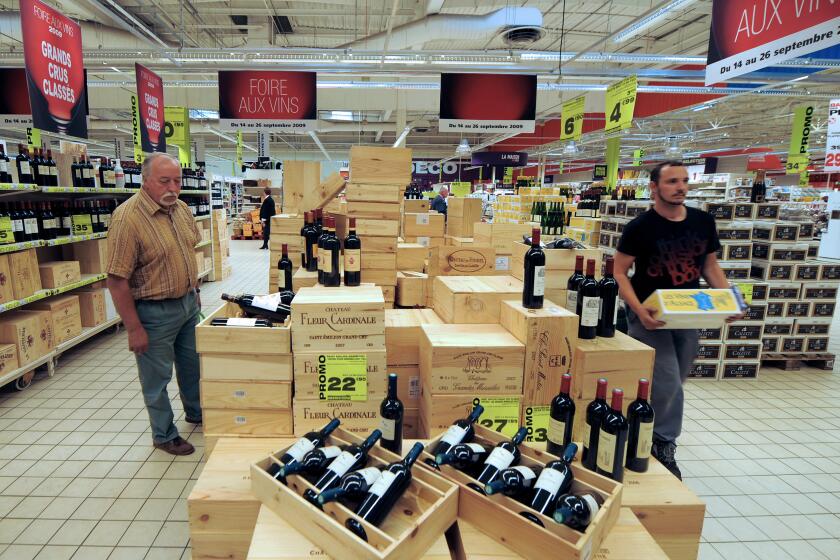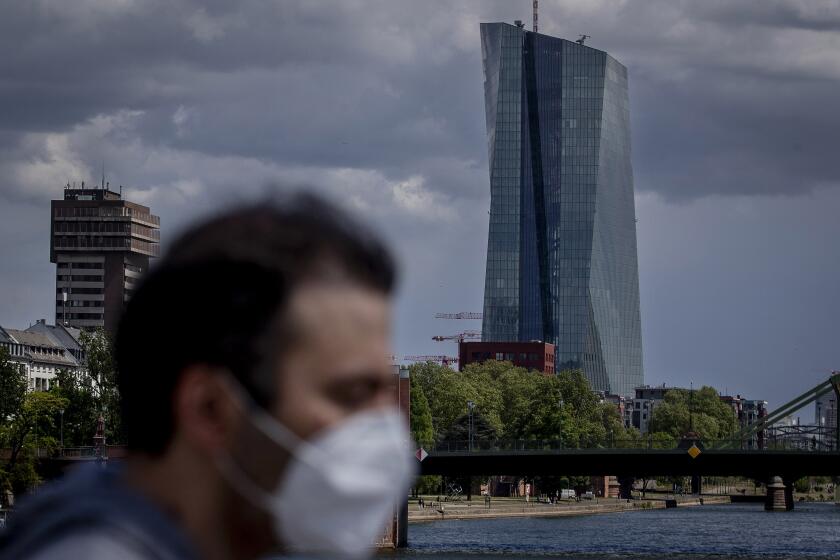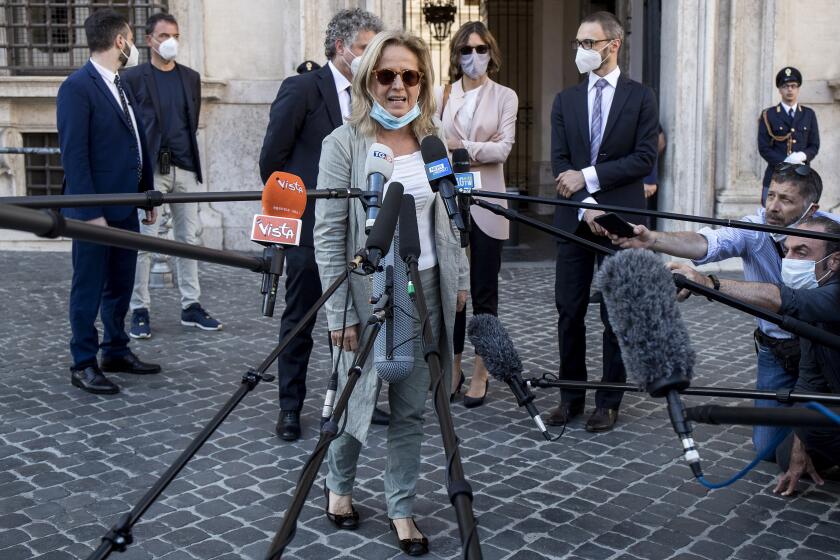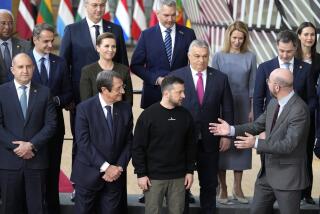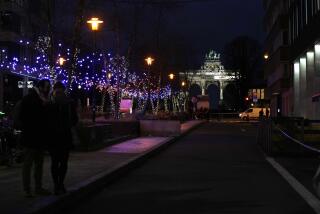Far apart — literally and figuratively — EU leaders gather to debate coronavirus recovery
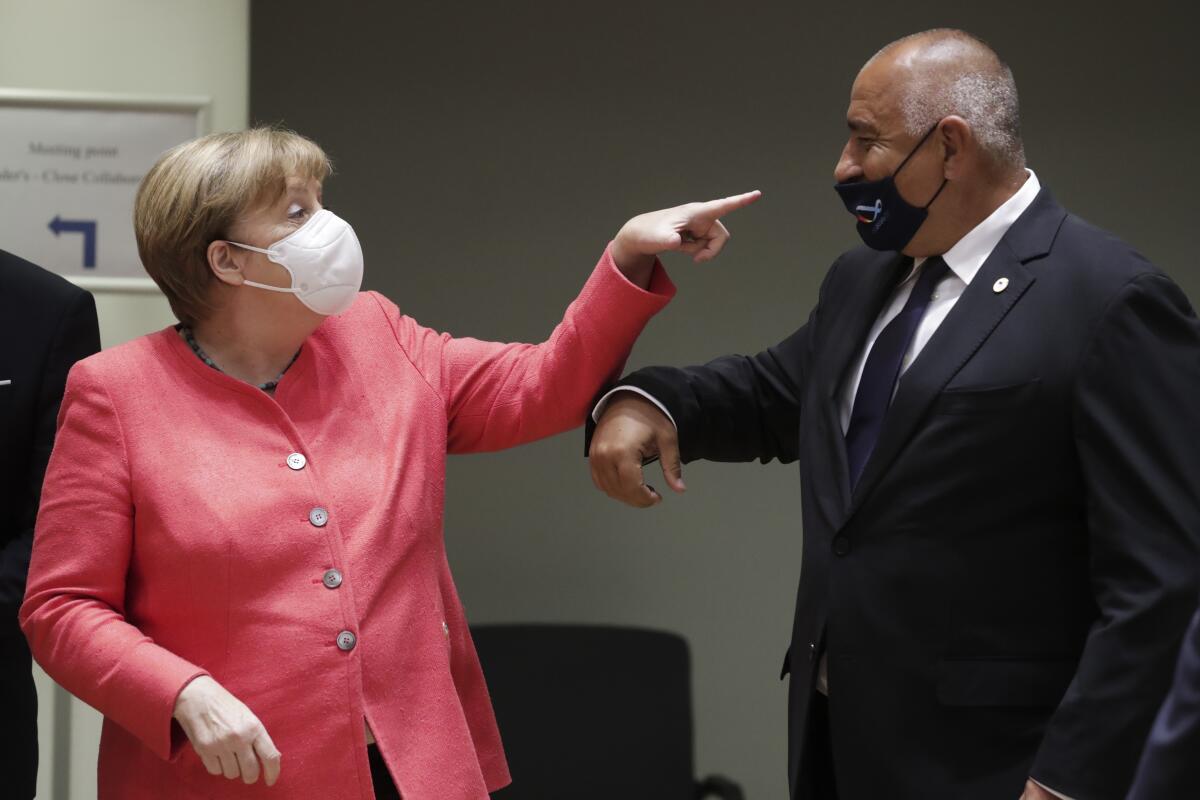
- Share via
BRUSSELS — Near the end of Friday’s opening summit day, European Union leaders acknowledged they were about as far apart from reaching a deal on an unprecedented $2.1-trillion EU budget and coronavirus recovery fund as the seating distance imposed upon them for health reasons.
“The differences are still very, very big, and so I can’t predict whether we will achieve a result this time,” said German Chancellor Angela Merkel. “So I expect very, very difficult negotiations.”
After two full sessions, the leaders briefly broke up ahead of dinner to allow summit host and European Council President Charles Michel to work with individual nations to narrow down their sizable differences over who should give and get the money and under what conditions.
On a terrace at the top of the summit center overlooking the Belgian capital, Michel had talks with Merkel, French President Emmanuel Macron, Dutch Prime Minister Mark Rutte and Hungarian Prime Minister Viktor Orban — many of the opposing forces that could turn the summit into a failure by Saturday night.
Czech Prime Minister Andrej Babis said that on several key issues, “I don’t have the agreement that we are getting close to an agreement.”
“I am not optimistic, but you never know. Nobody wants another meeting,” said Rutte at the start of the summit.
Macron underscored the importance of the challenge. “The coming hours will be absolutely decisive,” he said. “It is our project Europe that is at stake.”
The challenges facing the 27 EU leaders are formidable. The bloc is suffering through the worst recession in its history because of the COVID-19 pandemic, and member states are fighting over which nations should pay the most to help other countries and which should get the most to turn around their battered economies.
As the summit got underway Friday morning, all leaders were wearing masks. The usual hugs, handshakes and kisses were replaced by friendly nods and elbow bumps.
The jovial atmosphere was not expected to last long at what will likely be one of the most bruising summits of recent times. What is scheduled as a two-day meeting could go longer, if necessary, to bridge the differences among leaders.
A looming recession due to the coronavirus imperils Champagne, buffalo mozzarella and other European delicacies. They’re luxuries but also livelihoods.
The urgency is such that the leaders have ended a string of coronavirus-forced video summits and are meeting in person for the first time since the pandemic began its devastating sweep around the globe.
The usual summit venue, an intimate room high up in the urn-shaped Europa center, was deemed too snug to be safe. Instead, the leaders have been sent down to meeting room EBS-5, whose spacious confines normally fit 330 people.
The European economy shrank by 3.8% in the first quarter as business activity screeched to a halt in order to slow the spread of the coronavirus.
Delegations were cut to a minimum, leaving leaders more dependent on their own knowledge of complicated dossiers. That should put a smile on the face of Merkel, a detail-oriented leader who has been in office for 15 years and seen countless European partners come and go.
Since the pandemic struck, she has been seen as a safe pair of hands to steer her country through the crisis. Now that Germany holds the rotating six-month EU presidency, her stature will be even greater at the summit. And throw in that she is celebrating her 66th birthday on Friday.
The members were already fighting bitterly over the seven-year, 1-trillion-euro EU budget — about $1.1 trillion — when COVID-19 was still a story focused in Wuhan, China, late last year. Then the virus hit Europe head-on, and estimates are now that the economy of the 19 countries that use the euro currency will contract by 8.7% this year.
In Britain, France, Spain and Italy, grassroots groups of people grieving the loss of loved ones ask their governments: ‘Why?’
The EU was at a loss as to how to coordinate the policies of its member states early on. Now, the EU’s executive arm is proposing a 750-billion-euro recovery fund, partly based on shared borrowing, to be sent as loans and grants to the most needy countries.
Merkel, who is in her last term and has her political legacy at stake, already got normally frugal Germany to agree to join in a common debt program to alleviate the economic suffering in mostly southern and eastern member states.
And she has agreed to include outright grants, not just loans, in the recovery package to avoid overburdening member states with high debt already.
Rutte said he would stick to his tough line against such liberality, raising the specter that a further summit might be needed.
There are also plans to link budget funds to respect for basic democratic rights that the European Parliament says are under threat in nations such as Hungary and Poland. Some Eastern European nations will object to having that as part of the deal.
Hungary’s Orban was clear upon departure that he would fight any such strings attached to the plan.
“The Hungarian position is clear: Hungarians should decide about Hungarians’ money,” he said.
More to Read
Sign up for Essential California
The most important California stories and recommendations in your inbox every morning.
You may occasionally receive promotional content from the Los Angeles Times.
